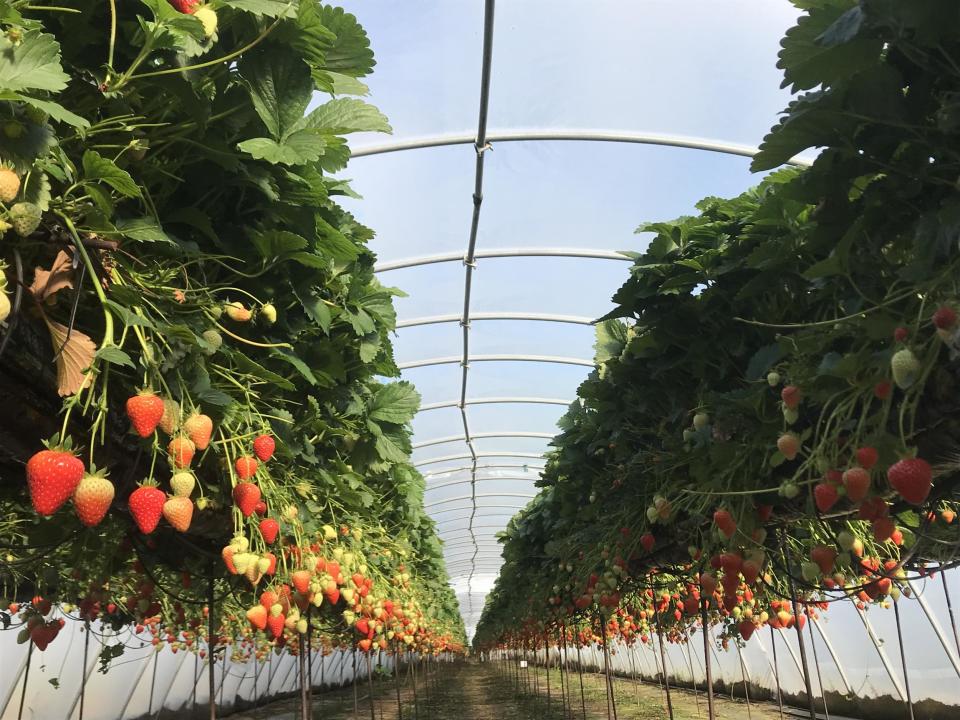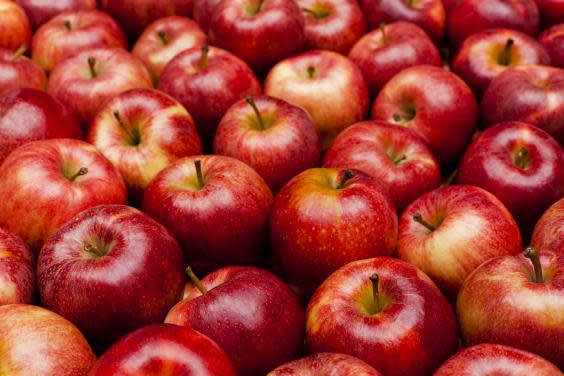'Feed the Nation': Britain urged to take up work in the fields as coronavirus threatens fruit and veg supplies

Aisle upon aisle of empty shelves and long queues for basic groceries have been among the most visible early signs of the coronavirus pandemic.
While it may seem a trivial concern when placed alongside Covid-19’s rising death toll, there’s something undeniably alarming about the sight of supermarkets stripped bare which has brought home the seriousness of the situation to many of us.
But this is, as supermarket bosses have been at pains to repeat, an artificial problem. There is no shortage of food, just an excess of demand as people stock up. So far, at least.
When it comes to making sure everyone is fed, the front line of the fight is not in the pasta aisle at Tesco as shoppers scrap it out for the last pack of fusilli, but in fields up and down the country.
British farmers warned this week of a coronavirus-induced labour shortage that could see millions of tonnes of strawberries, cabbages, apples, cauliflower lettuce and more rotting in the fields.
For many years, the bounty of Britain's agricultural land has been picked and packed mostly by Eastern European hands. Work that years ago used to be the preserve of students making some extra money over the summer is now almost exclusively done by migrant labour.
Some of those seasonal workers, mostly from Bulgaria, Romania, a few from Lithuania, are already in the UK but restrictions to stop the spread of Covid-19 mean there is a shortage of about 50,000 seasonal workers, presenting a serious problem for farmers.
To plug the gap they have joined forces and launched a nationwide recruitment drive, calling on Britons to "Feed the Nation" by taking up seasonal roles in the fields. It's hoped that those who may have lost their jobs as a result of the crisis - chefs, retail assistants, waiters and others - will seize an opportunity for a very different kind of work.
So acute is the need that the government is reportedly readying its own "Pick for Britain" campaign taking inspiration from the Land Army that tilled the fields during the Second World War.
"Most places are OK for labour at this point, but in six weeks we'll be picking," says James Porter, whose family owns East Scryne Farm, a soft fruit farm near Carnoustie, home of the storied golf course on Scotland's east cost.
With a picking season that starts in early May, soft fruit farmers are at the sharp end of a potential coronavirus labour shortage.
Most of East Scryne's pickers would normally arrive at the end of April to start picking raspberries, blueberries, blackberries and strawberries - the fruit that's often seen as the quintessential symbol of British summer.
"We're concerned that we won't be able to bring those people over and we have to look at alternatives," says Porter.
The farmers' call to arms needs to be answered soon if we are to avoid a supply shortage that would trigger higher prices. If things drag on, the apple harvest could suffer as could vegetables like cauliflower, broccoli, celery and cabbage.
That would mean more imports of fresh fruit and vegetables. But other countries are experiencing their own problems. In Kenya, a major supplier of Europe's green beans and peas, Reuters reports that half of workers involved in growing and exporting have been sent home as flights are grounded and prices for freight rise.
Spain is Europe's largest exporter of fruit and vegetables and a big supplier to the UK. But it too relies on thousands of migrant workers, many of them from Morocco, who have also been stranded at home due to Covid-19 travel restrictions.
It's fair to say that British workers have turned their noses up at seasonal farm work in recent years, perhaps partly due to the availability of other, more secure jobs in more comfortable surroundings.
"It's hard work and the Eastern Europeans are experienced at what they do," says Oliver Shooter, owner of AE Lenton, which runs a group of farms between Skegness and Boston in Lincolnshire, the centre of England's vegetable production.
"It's not rocket science but it is quite a skilled job that these guys do," he says. A top picker needs to know and apply supermarkets' exacting standards for exactly how fruit and veg must look, as well as how to cut it and pack it. For that they'll earn £12 an hour if they're good. Many farms also provide free or subsidised accommodation.
The process is more high-tech than most would probably imagine, says Beverly Dixon, group HR director at G's, a network of large farms growing salad vegetables across East Anglia.
"We harvest our products in rigs, little mobile factories that go out into the field. They cut the veg at the front of the machine, it travels along a conveyor belt, gets trimmed, wrapped, boxed and put onto pallets all in one go, ready to be transported."
Each rig is manned by a team of 16 who work as a family unit and will be kept apart from others as part of social distancing measures the farm is introducing.
G's is looking for 700 seasonal staff, many of them pickers, but also jobs in packhouses and processing operations, team leaders, quality checkers, tractor drivers, bus drivers, forklift operators, some administrators and a handful of engineers.

Bardsley, one of Britain's biggest apple producers, with an 850-hectare estate in Kent, says that in just a few days since the recruitment campaign launched the response has been "overwhelming".
Come July, when Bardsley starts harvesting 90 million apples - mostly Royal Gala, Braeburn, Cox's and the farm's prize-winning Bramleys - it will need some 500 extra workers. "We've put out the message on our social media saying 'come and join us', particularly to those people who unfortunately may be out of work at the moment. We are not slowing down," says marketing director Georgia Bardsley.
"We've had such a diverse range of people getting in touch." Among them are many who had until recently been working the hospitality sector that's been hit so hard by the coronavirus, including one head chef.
"Hopefully it gives people who have been affected a bit of hope," says Bardsley.
The company's agricultural technology director, Antony Yousefian, says he's quietly confident the farm will find the people it needs. He also sees another potential positive to the situation.
"We've seen a big change in consumers wanting to connect with what they eat in the last few years," he says. "What a great opportunity for people to do that.
"I think, longer term, students will come back to doing this as a summer job.
"More and more of our jobs are higher skilled. We're hiring software engineers now, we've got data analysts. So if you are a graduate, what a way to get into a farming business and apply yourself. In the day earn a bit of money and in the evening you might do some data analysis."
Yousefian is currently building a digital map of the orchard to help the farm managers make better decisions by giving them real-time data on things like the climate, soil health and how much fruit is on the trees.
"The whole industry is changing. It's not a job that you turn your nose up at anymore."
Read more
‘Green lanes’ could ease shortages of fruit and veg to European shops
Government adviser under fire for saying UK farming sector not needed
Brexit is an chance to showcase Britain’s farming
Strawberry, white chocolate and pistachio choux buns
Food banks in crisis as coronvirus panic buying leaves families hungry
Heartbreaking photo of elderly man by empty supermarket shelves

 Yahoo Finance
Yahoo Finance 